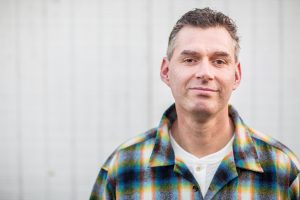 When Jason first moved out of home, like many young people, he struggled to keep his life in order without his family looking after him.
When Jason first moved out of home, like many young people, he struggled to keep his life in order without his family looking after him.
Looking back now he recalls living in a messy, disorganised state, losing his keys and not being able to get back into his own home.
“It’s something you take for granted as an adult but when you are young, it can be really distressing having to live independently. It is a very big thing, I don’t think I really mastered it until I was in my mid-20s,’’ he says.
So when he saw an ad for Anglicare Victoria’s live-in youth mentor program, he saw it as an opportunity to make a real difference.
“I saw it as a chance to help young people engage in their community and pass on some of the living skills I struggled with as a young person,’’ he says.
Jason has been a volunteer live-in youth mentor for the past five years, sharing a home with around 10 different young people over that period, helping them make the transition from living in out-of-home care to living independently after they turn 18.
A typical day for a live-in youth mentor can include cooking a meal with a young person, showing them how to follow a routine so they can get to school or work, taking them to sport, teaching them to clean or helping them apply for a job. It can also include playing board games, watching TV or going to the gym.
Youth mentors also provide guidance and emotional support to young people, and provide a consistent adult presence in the home.
Mentor, role model and confidence-builder
“Role modelling is very important,’’ says Jason. “If a young person sees you getting involved in education or getting up every day, going to work and cooking and cleaning, it can give them the confidence to think that they can do it too.’’
Jason admits that the role can sometimes be challenging, as young people are often recovering from periods of instability and trauma. Many have had experiences which make independent living difficult.
“The challenges are far outweighed by the positive outcomes achieved by the young person during their stay in the program, whether they are re-engaging with family or education,’’ says Jason.
How the program works
As part of the program, two adult live-in youth mentors share a home with two young people. This can be two individual live-in youth mentors, or couples who have decided to take on the role together.
A team of qualified case workers, education experts and child welfare workers are also on hand to provide ongoing support.
People who are working or studying are strongly encouraged to apply, as it provides great role modelling for young people on how to live a balanced life.
Jason’s career background is in the community sector. He has worked in the drug and alcohol, crisis accommodation and residential care fields, and is currently studying for his Bachelor of Youth Work. However, live-in mentors also come from career backgrounds as diverse as banking and teaching.
It is a volunteer role but live-in youth mentors get to live in a fully furnished house rent-free and all utilities are paid. There is also an ongoing allowance of $150 a week.
Jason counts many highlights over his years of being a live-in youth mentor.
“It can be something as simple as seeing the young person out in the supermarket, and seeing that they are shopping and cooking, and not just living on takeaway,’’ he says.
“It can be kids who were on their L-plates when they were living in the house, driving past with their P-plates – or kids who used to live in the house getting in touch to say hi, and their lives are going well and they’ve just come back from holidays.’’
CURRENT LIVE IN YOUTH MENTOR VACANCIES
To apply or for further information, please contact Joe Kerton on 8470 9938 or Joe.Kerton@anglicarevic.org.au


